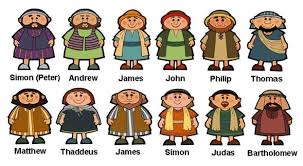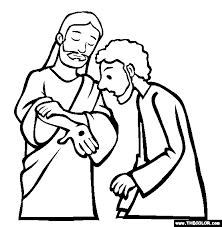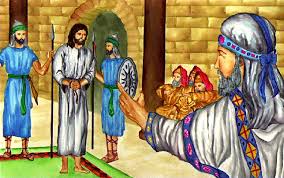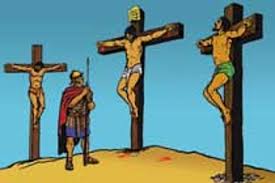Joshua 2:1 – And Joshua the son of Nun sent two men secretly from Shittim as spies, saying, "Go, view the land, especially Jericho." And they went and came into the house of a prostitute whose name was Rahab and lodged there.
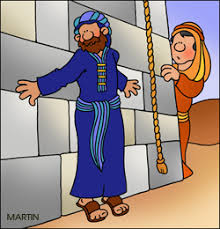
In this chapter, we have the account of the two spies sent by Joshua to gather military intelligence about Jericho.
We can't help but be reminded of the failed mission that occurred some 40 years earlier when the 12 spies were sent into the Promised Land by Moses. Let's take just a minute to discuss how these two events are different.
When Moses sent the 12 spies into the Promised Land, their mission was to survey all the districts in the land and bring back information to the rest of Israel. They were to assess the goodness and fertility of the land, the magnitude and number of the cities, and the nature of the inhabitants.
The object in sending the spies was to give a positive and amazing witness to the people, who would then move with alacrity to conquer the land. In other words, the purpose of sending the spies was to build the faith and confidence of the people.
Unfortunately, due to a complete and utter lack of faith on the Israelite's part, 10 of the spies responded in fear and the people refused to take the land as God commanded.
In the present instance, Joshua did not send the two spies out to inspect the land; Israel already knows what the land is like. Also, there is no need to build faith in this generation – they have already defeated several enemies and they are ready to march forward and claim their inheritance.

This time, the spies or scouts are sent specifically for military intelligence. Joshua wanted to know whether or not there was a passage over the Jordan, and if the people of Jericho were alert and ready for battle. The spies/scouts were also examining the city's fortifications and looking for any other unexpected dangers.
It's important to note that this did not reflect a lack of faith on the part of Joshua. Anytime we partner with God to get things done, we must be diligent to do our part; when we act prudently and prepare as well as we can, we can rest assured that God will do the rest. The key is that we must actively participate in the partnership by doing all we know to do. This is exactly what Joshua did.
The two spies/scouts set out and arrived at the house of a prostitute named Rahab. Although some scholars maintain that she was an inn keeper, the original Hebrew word in this passage clearly means 'harlot'.
Romans 3:23 - For all have sinned, and come short of the glory of God;
However, there is really no need to try and 'clean up' the image of Rahab; ALL of us have sinned and come short of the glory of God.
As we will see, Rahab plays a pivotal role in the success of the spies' mission. In the end, she becomes an Israelite. In fact, the lineage of King David passes through her. We will take a closer look at this later on in our study, but for now we can meditate on the goodness and grace of God, who welcomed this pagan sinner into the fellowship of Israel.
Now, scripture simply says that the spies came to Jericho (approximately eight miles from the river) and entered Rahab's house. How do you suppose they wound up there?
One thing we should keep in mind is that the spies would have been anxious to avoid any public places. Since strangers are always noticed and they didn't want to be arrested on charges of espionage, the fewer people who saw them, the better.
With that in mind, one theory is that Rahab was 'out and about' looking for business when the two spies came upon her. After reaching some agreement, she quickly led them directly to her house, which was built into the city wall. This is one scenario which would keep the spies out of the more public thoroughfares.
Another theory says that the prostitutes were probably located all together in a kind of 'red light' district which was avoided by a large portion of the population, especially during daylight hours. It may have been that the spies went directly there to avoid being seen in the general marketplaces.
A third theory speculates that Rahab was outside the city gates traveling the public roads when a 'chance' (divine) encounter brought her into contact with the spies. After realizing who they were, she agreed to help them and took them into the city with her.
Regardless of how the scouts found Rahab, we can be sure that divine intervention and protection were involved because God led them to the one person in the city who was willing to help!
Joshua 2:2 –And it was told to the king of Jericho, "Behold, men of Israel have come here tonight to search out the land."
For the most part, the cities and towns of Palestine were individual kingdoms or states whose rulers were called kings. This was clearly the case in Jericho.

The fact that the king of Jericho heard news of the scouts makes complete sense because news of the nation of Israel and her God had spread all throughout the region:
- God had delivered his people from slavery in Egypt.
- God led his people in a pillar of clouds and fire.
- God parted the Red Sea, and his people crossed over on dry land.
- God rolled the waters back upon Pharaoh and his officers, who then drowned.
- God provided water and food (manna) for his people as they traversed the desert.
- God fought for his people during their many battles.
In fact, the pagan nations of Canaan were terrified of Israel because her God was much more powerful than any of their multiple deities.
Given the circumstances, it is probable that watchman had been posted on the city walls and at strategic points within the city to watch for any/all suspicious strangers. Despite their best efforts to remain unnoticed, the scouts were spotted and subsequently followed to Rahab's house. News of their presence was reported to the king, who waited for nightfall.
Joshua 2:3-4 – Then the king of Jericho sent to Rahab, saying, "Bring out the men who have come to you, who entered your house, for they have come to search out all the land."But the woman had taken the two men and hidden them. And she said, "True, the men came to me, but I did not know where they were from."
Once the city gate is shut for the night, and escape seemed impossible, the king sent soldiers to capture the men he correctly believed to be spies of Israel.
But Rahab had anticipated this possibility and as a result, she had hidden the men on her rooftop, under some drying flax.
When questioned by the soldiers, she answers wisely; she does not deny the men were at her house. To deny their presence completely would have resulted in her own arrest along with charges of treason and probable execution.
Joshua 2:5 – "And when the gate was about to be closed at dark, the men went out. I do not know where the men went. Pursue them quickly, for you will overtake them."
Rahab deceives the soldiers by falsely claiming that the spies abruptly left immediately before the gates closed for the night.
This lie succeeded in misleading the officers sent by the king. After all, her story sounded plausible enough – the spies would not risk capture by being locked up in the city overnight. Plus, as far as the soldiers knew, Rahab had no reason to lie to them; if Jericho was overtaken she would suffer the same fate as her countrymen. For these reasons, the soldiers believed her story.

Furthermore, she plants the thought in their minds that if they act quickly and immediately search for the spies outside the gate, they will find their enemies and gain an advantage over Israel. Thus, she kept them from searching her house – the only obvious place for the spies to be!
By hiding the spies and misdirecting the soldiers of Jericho, Rahab is actually demonstrating her faith in the God of Israel. We are specifically told this by the apostle James:
James 2:25-26 - Likewise also was not Rahab the harlot justified by works, when she had received the messengers, and had sent them out another way? For as the body without the spirit is dead, so faith without works is dead also.
Why would Rahab choose to side with Israel?
Her decision was based on spiritual awareness. Rahab heard the same testimonies of the power of God that the rest of her nation heard. But unlike her countrymen, she allowed those testimonies to build her faith in Jehovah as the only true God. While they continued to trust in false idols and physical strength for deliverance, she cast herself on the mercy of the true God. She did this in the only way possible – by assisting the scouts.
This leaves us with a bit of a quandary... how can she be rewarded by God for lying?
This is a question that has been debated at length by many people. You are welcome to study this issue on your own, but for our purposes we will simply say this: Rahab was a sinner and a pagan who knew nothing of the holy ways of God. Upon hearing of Jehovah she reached out to him in faith in the only way she could, and because of that she was accepted by him despite her folly.
Hebrews 11:31 - By faith the harlot Rahab perished not with them that believed not, when she had received the spies with peace.
Siding with Israel against her own people was a huge step of faith in God!
Joshua 2:6 – But she had brought them up to the roof and hid them with the stalks of flax that she had laid in order on the roof.
When was the last time you were up on the roof of your own house? For many people that answer is 'never'!
Our roofs are steep/angled and they have only one purpose – to keep our houses dry. But back in the days of ancient Israel, the homes were all made with flat roofs, which essentially made them additional living space. They used them much as we would use a patio. You could meet guests there, enjoy the cool breeze in the evening, eat or even sleep there. For example:
- King David was on his roof when he first saw Bathsheba (II Samuel 11:2).
- The people of Israel used their roof tops to set up booths for the feast of booths (Nehemiah 8:16).
- The friends of the paralytic tore a hole in the roof and lowered him down into the house in front of Jesus (Mark 2:4).
Evidence also suggests that in ancient times, people (pagans and Israelites alike) often prayed on their roof tops. This space could also be used for work or household related purposes, such as drying flax or hemp.
The roof was an obvious place for the scouts to hide and an easy place for the soldiers to search, yet they did not do so. So, we see that God provided a safe place for his servants, even in the midst of enemy territory.
Joshua 2:7 – So the men pursued after them on the way to the Jordan as far as the fords. And the gate was shut as soon as the pursuers had gone out.
Based on the information of Rahab, the king's men leave the city and follow the same course the spies would have taken – the road that leads to the fords of the Jordan. As we previously noted, this was a distance of about eight miles.
The soldiers must have been searching for the men all along the way, in case they had hidden themselves. This delay gave Rahab enough time to safely send the scouts on their way back to Israel.
Joshua 2:8-9 – Before the men lay down, she came up to them on the roof and said to the men, "I know that the Lord has given you the land, and that the fear of you has fallen upon us, and that all the inhabitants of the land melt away before you."
Having sent the king's men on a wild goose chase, Rahab now returns to bargain with the men of Israel. She begins by mentioning two things which, in her mind, specifically confirm that Jehovah is the one true God.
First, only the true God of the universe could have caused such utter terror to fall upon the people of the region. The soldiers of Jericho were a formidable army who had often struck fear into the hearts of their enemies. But now, hearing rumors of Israel and her God, they were so terrified that their strength and courage drained away like wax melting before a fire (Exodus 15:15). This is exactly what God promised he would do for Israel:
Deuteronomy 11:25 – No one shall be able to stand against you. The Lord your God will lay the fear of you and the dread of you on all the land that you shall tread, as he promised you.
Rahab is also firmly convinced that all of the land (the entire earth) belongs to the one true God, who is the ultimate ruler of the nations. He is able to give the land to whatever nation he chooses. She understands that God has resolved to give the entire region of Canaan (including Jericho) to his people. Since this is the case, there is nothing that Jericho or its idols can do to stop Israel.

Let's consider the example of Rahab for a minute. She knew nothing of the covenant between God and Israel; she herself had no right to claim any of his promises. She had heard limited testimonies of the power of God and seen him perform one or maybe two mighty acts, yet she fully and completely believed on him, doubting nothing.
What about us? We have a better covenant with God that Israel did. We have the scriptures which describe, in great detail, the promises that God has made to us. These promises include forgiveness, healing, provision, protection, power and many others. Yet, we sometimes fail to trust him! Why is that? Where is our faith?
Joshua 2:10 – "For we have heard how the Lord dried up the water of the Red Sea before you when you came out of Egypt, and what you did to the two kings of the Amorites who were beyond the Jordan, to Sihon and Og, whom you devoted to destruction."
It is interesting that Rahab brings up the crossing of the Red Sea when Israel left Egypt. That event had occurred forty years before she met the spies. Forty years is basically half of a lifetime. If Rahab was alive then, she would only have been a child. This means that her knowledge of that event came from others – the stories of her parents or grandparents.
There is a valuable lesson here for us. We need to be diligent in starting our children off with a good foundation in scripture. We can help 'hide' biblical truths deep in their hearts, so that these teachings will resurface later in life, just as they did for Rahab.
Psalm 119:11 - Your word have I hid in my heart, that I might not sin against you.
Perhaps current events (the victories that Israel won over Sihon and Og) served to stir up and confirm the teaching she received from her parents as a child. Maybe this is why she responded to the testimonies of God with faith, instead of fear like the rest of her countrymen (Luke 8:37-39).
If you have a chance to impart scriptural principles or narratives into the children in your life, do it! You are sowing seeds that will sprout in the future!
Joshua 2:11 –"And as soon as we heard it, our hearts melted, and there was no spirit left in any man because of you, for the Lord your God, he is God in the heavens above and on the earth beneath."
This is clear evidence that Rahab considered Jehovah to be the only true God, not just a minor deity among many others in this polytheistic society.
It was common for the pagans to believe in multiple gods (example: Egypt). Their belief was that each god had power/authority/influence over a select region:
1 Kings 20:23 - And the servants of the king of Syria said unto him, Their [Israel's] gods are gods of the hills; therefore they were stronger than we; but let us fight against them in the plain, and surely we shall be stronger than they.
But Rahab declares, in absolute terms, that all power and might belong to the God of Israel alone; he rules and reigns over all of heaven and earth. He will determine the outcome of the battle between Israel and Jericho because nothing occurs without his consent/permission.
Joshua 2:12-13 – "Now then, please swear to me by the Lord that, as I have dealt kindly with you, you also will deal kindly with my father's house, and give me a sure sign that you will save alive my father and mother, my brothers and sisters, and all who belong to them, and deliver our lives from death."

Rahab's faith is astonishing! Israel hasn't even crossed the Jordan; Jericho certainly hasn't been threatened, yet she sees the 'things that are not as though they are' – she is certain that Israel will be successful in breaking through the fortified walls of Jericho and capturing the entire city. At that point, the people of Jericho, including Rahab and her family, will be at the mercy of Israel.
Because of her faith in of God, she has dealt mercifully with the spies. She now requests mercy in return – she wants safety for herself and her family. She is justified in doing so, because the Lord tells us that those who bless Israel will themselves be blessed:
Genesis 12:3 - And I will bless them that bless you, and curse him that curses you: and in you shall all families of the earth be blessed.
She then asks the spies to do something significant – to swear an oath to the Lord. An oath was the greatest security she could hope for in this situation. All nations believed that their gods would avenge those who broke oaths. She must have concluded that the God of the universe was no different; in fact, if an oath were sworn to him, it would surely be honored.
When Rahab asks the spies for lives of her family, what exactly is she asking for? In her mind, the best possible outcome would be for them to remain alive as slaves of Israel. But look how God honors her faith – the entire family is assimilated into the nation of Israel. Instead of being slaughtered, they are free people who enjoy all the covenant privileges given to proselytes of the faith!
Let me offer you some encouragement:
One of the central concepts in today's post is faith. Obviously, Rahab had faith in God, which she demonstrated by showing mercy to the scouts.
But don't forget, the scouts had faith too! When Joshua asked them to assess the military position of Jericho, they simply took the first step – they left camp and looked for a way to cross the Jordan.
They demonstrated their faith by moving forward with the assignment, trusting that God would open a door each time they needed it (as opposed to seeing the whole plan up front).
God often works this way with us – we simply need to take the first step of faith, then he will provide the next open door when we need it. Whatever you are asking God for, I encourage you to take that first step of faith today! And remember, when God opens a door for you, no man can shut it!
Let me offer you some relief and strength:
In today's post we noted that Rahab deceived the soldiers who came looking for the spies. Deception is an important strategy in warfare; military opponents are always trying to gain an upper hand through secrecy or deception.
 As Christians we need to remember that we are engaged in a spiritual war against Satan, the enemy of God.
As Christians we need to remember that we are engaged in a spiritual war against Satan, the enemy of God. Satan is a master of deceit (Revelation 20:3). His whole strategy is to deceive us into thinking that God is unfair, unjust or that he is withholding good things from us. This is exactly what he implied when he convinced Eve to eat from the forbidden tree in the Garden of Eden (Genesis 3:1-6).
But we can strengthen our faith and avoid being deceived by knowing the word of God and walking according to the Spirit. When we do these things, we move confidently into the future being firmly convinced that God is always working all things together for our good (Romans 8:28). He is always good to us all the time!




























